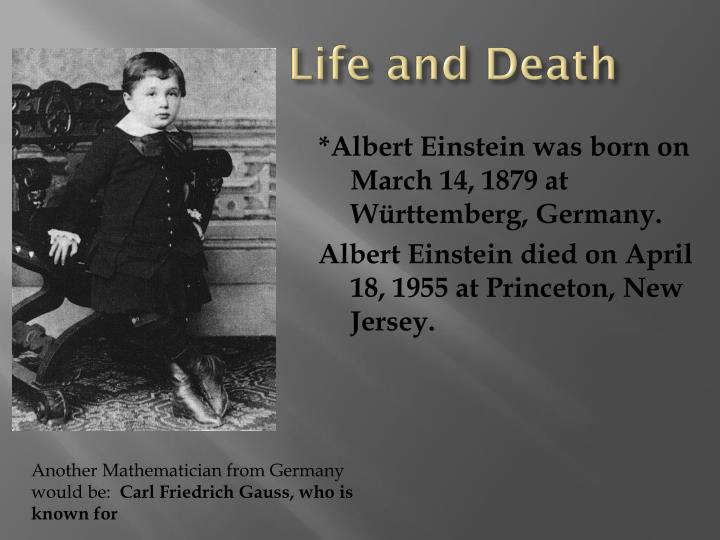Albert Einstein: Birth, Death & Legacy Explained
Could the universe as we know it be fundamentally different if not for one man? Albert Einstein, a name synonymous with genius, reshaped our understanding of space, time, matter, and energy, leaving an indelible mark on the 20th century and beyond.
Born in Ulm, Wrttemberg, Germany, on March 14, 1879, into a secular Jewish family, Albert Einstein's journey from a seemingly ordinary childhood to a scientific icon is a testament to the power of curiosity and relentless inquiry. He was the first child of Hermann and Pauline Einstein. As a child, Einstein found himself captivated by the world around him. He developed a keen interest in music. His theoretical work fundamentally changed our comprehension of the cosmos. This groundbreaking work, encompassing the theories of relativity and the photoelectric effect, garnered him the Nobel Prize in Physics in 1921.
| Attribute | Details |
|---|---|
| Full Name | Albert Einstein |
| Born | March 14, 1879, in Ulm, Wrttemberg, Germany |
| Died | April 18, 1955, in Princeton, New Jersey, USA |
| Nationality | German, later Swiss and American |
| Fields of Study | Theoretical Physics |
| Known For |
|
| Awards | Nobel Prize in Physics (1921) |
| Spouse(s) | Mileva Mari (m. 19031919), Elsa Einstein (m. 19191936) |
| Children | Hans Albert Einstein, Eduard Einstein, Lieserl Einstein (believed to be illegitimate) |
| Education | Swiss Federal Polytechnic (ETH Zrich) |
| Significant Contributions |
|
| Influences | James Clerk Maxwell, Isaac Newton, Max Planck |
| Influenced | Countless scientists and thinkers across various disciplines |
| Link to External Resource | Nobel Prize Biography |
The man who reshaped our view of the universe shared his birthdate with Pi Day, March 14th, a date that reflects the first three digits (3.14) of the mathematical constant pi. This connection adds another layer of fascination to his already remarkable legacy. It is interesting to note that his birthday also aligns with the date of Stephen Hawking's death.
- Discover Pastor Keion Hendersons Inspiring Messages Sermons
- From Wrestling To Hollywood Liv Morgans Movie Journey More
Einstein's early life was marked by both fascination and challenges. He overcame academic struggles to emerge as a scientific icon. His early education was marked by a certain independence of thought. In 1905, a pivotal year, Einstein published groundbreaking papers that would forever change the course of physics. These included the theory of relativity and the photoelectric effect, for which he later received the Nobel Prize in Physics in 1921. These advancements redefined our understanding of space, time, and matter, establishing him as a giant in the scientific community.
His theories, particularly those of relativity, offered revolutionary perspectives on space, time, and gravity. He was a great experimentalist, thereby putting newton in a class by himself among empirical scientists.
Einstein's impact extended beyond the realm of physics. After the war, he lobbied for nuclear disarmament and a world government, advocating for peace and international cooperation. He fought against nuclear tests and bombs along with Albert Schweitzer and Bertrand Russell.
- Allison Bridges Wife Of Chris Robinson More Unveiling Her Story
- Enable Mms Messaging On Iphone Simple Guide Troubleshooting
His life was not without its health struggles. Due to overexertion, he suffered from a heart illness that required him to stay in bed for several months. Helen Dukas began working for Einstein on April 13th, eventually becoming his housekeeper after the death of Elsa Einstein.
The end of his life came on April 18, 1955, at the age of 76, at Princeton Hospital in Princeton, New Jersey. He died due to internal bleeding caused by the rupture of an abdominal aortic aneurysm. He faced his final moments with remarkable composure, refusing medical intervention and accepting his fate with a sense of calm, better than those around him.
His passing, however, was not without its physical considerations. It is believed that a cause of death could have been exacerbated by another factor: smoking. According to studies, men who smoked were 7.6 times more likely to experience a fatal abdominal aortic aneurysm (AAA).
Einsteins legacy continues to inspire. His work has provided the foundation for modern cosmology. His scientific work, the theories, and his intellectual curiosity have led to modern innovation. His birthday, March 14, is a date to consider the contributions and impact of science. As with the great thinkers before and after him, he transformed the world. His genius made the world a better place.
The documents contain a series of historical questions regarding the birth and death dates of notable figures. The document serves as an educational tool for learning about significant historical dates. His contributions put Newton in a class of his own among empirical scientists.
His death, on April 18, 1955, marked the end of an era. He was laid to rest in Princeton, New Jersey. His influence reverberates through every discipline. His intellectual prowess, his insights, have shaped our knowledge.
His final days are a testament to his character. In the aftermath of his death, no evidence of syphilis was found in Einsteins body or brain in the autopsy. His legacy continues to motivate scientists across the world.
The impact and influence of Albert Einstein are undeniable. He is one of the most influential figures of the 20th century.
His theories and understanding of space and time have inspired generations of scientists. Einsteins legacy endures, his impact and influence continue to shape our world.

PPT Albert Einstein NAME Albert Einstein OCCUPATION Physicist BIRTH

E=mc2 E=mc2 E=mc2 Albert Einstein E=mc2 E=mc2 E=mc2 E=mc2 E=mc2 E=mc2

PPT Albert Einstein PowerPoint Presentation ID 2678917